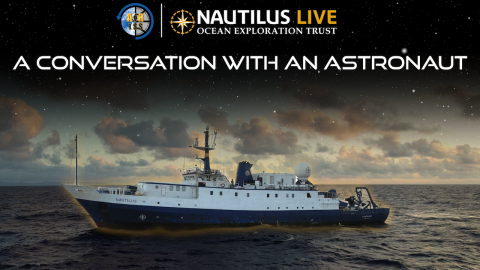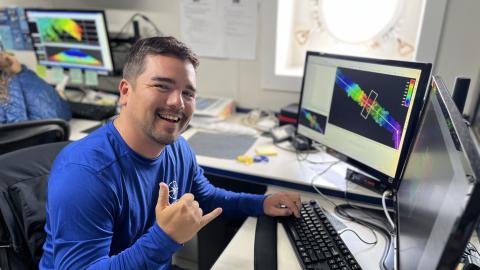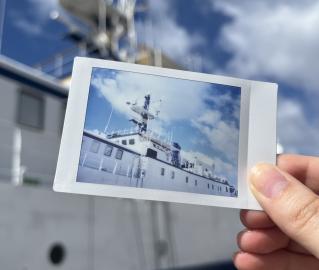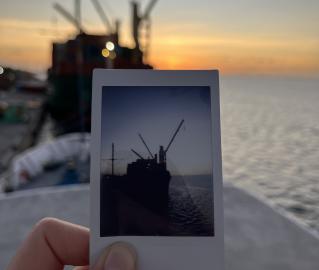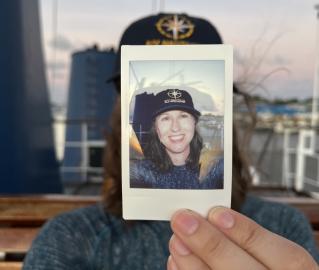Meet Ocean Explorer Ella Magrum-Stanley
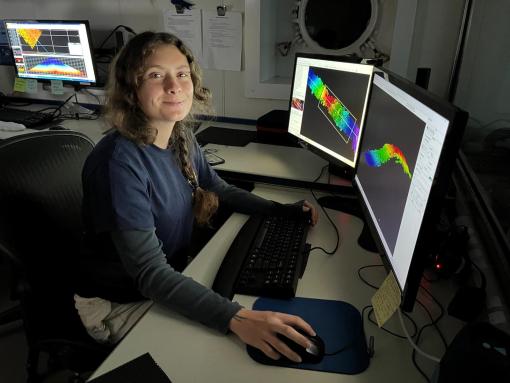
OET proudly welcomes Ella Magrum-Stanley to the Corps of Exploration as part of the Science & Engineering Internship Program. This internship program supports community college, undergraduate, and graduate students in building professional workforce experience and exploring STEAM-related careers that connect to research themes like robotics, ocean science, education, and exploration. Ella joins E/V Nautilus for our NA175 expedition as a Seafloor Mapping intern.
We sat with Ella to learn more about her experience at sea and the path that led her to Nautilus.
Describe your role with OET.
I am a Seafloor Mapping Intern. This means that as the ship collects data from the seafloor, in realtime using the multi beam echo-sounder, I go through and process the data. This requires me to clean the seafloor data, ensuring that the final product will be an accurate profile of the seafloor. This cleaning process is done by observing the many pings ( in a dot cloud format) and determining which data is real. It is surreal to know that these tiny points in your hands make up hundreds of meters of the seafloor. Additionally, we collect sub-bottom data, my role is just to keep an eye on that screen with the data coming in and adjust settings accordingly.
Can you tell us a little about your background? What influenced you as a child?
As a child I was always the curious type. My family would have yearly gatherings at the beach which sparked a natural interest in the ocean. I grew up in Texas where the only beaches were polluted, and as a kid I wanted to understand why. I was raised by two Moms and they always encouraged me to ask the big questions and chase the answers to satisfy my curiosity, in the safest way possible. I also grew up around a culture of water, as one of my mothers worked in water safety. Continuously throughout my childhood I had encounters with injured marine life which motivated me to find solutions. So I would say I was influenced by the water!
When you were a kid, what did you want to be when you grew up?
I jumped around many ideas from a doctor to an artist to marine biologist. I was full of curiosity for the world and didn’t want to fit into just one mold. But I eventually circled back to the Ocean.
What would you consider to be your greatest challenge entering this field?
I would say my greatest challenge would be proximity or lack of qualifications. I chose to do my undergraduate in the United Kingdom, but I currently live in Colorado. Now that I am in the field of ocean sciences with a degree under my belt I find that job opportunities exist mainly near the coasts and require a masters degree or higher. However, this internship was the perfect fit. I flew out to the ship and I have the ability to try a new field without a higher qualification to do so!
Do you have any advice for someone looking to follow a similar path?
I would say the biggest piece of advice that I have gotten and would recommend is to just put yourself out there! Email people, ask the questions, the majority of people in this field are enthusiastic when you want to know about their research! The times that I have reached out to people the response was excitement and a desire to help further my path in Ocean sciences.
What's next for your ocean studies and career?
The next step for me is applying to masters/ PhD programs! In my undergraduate I actually took a class that focused on marine geo hazards. This sparked an interest in deep sea volcanoes, submarine landslides, tsunamis and more! I am hoping to pursue a degree in Marine geology/geophysics/geochemistry! This internship has already been a great way to meet people associated with the schools I am applying to, and to further my skills in applying my studies to field science and data acquisition. Ultimately I want to travel and work all around the world using my Ocean focused degrees!
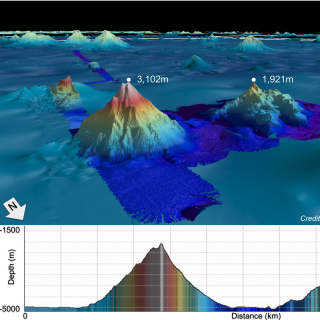
Seafloor Mapping Offshore Howland & Baker Islands
During this expedition, E/V Nautilus explores the waters offshore Howland & Baker Islands. Located roughly midway between Hawaiʻi and New Zealand in the Central Pacific Ocean, the islands of Howland and Baker are some of the most isolated land masses on Earth.
